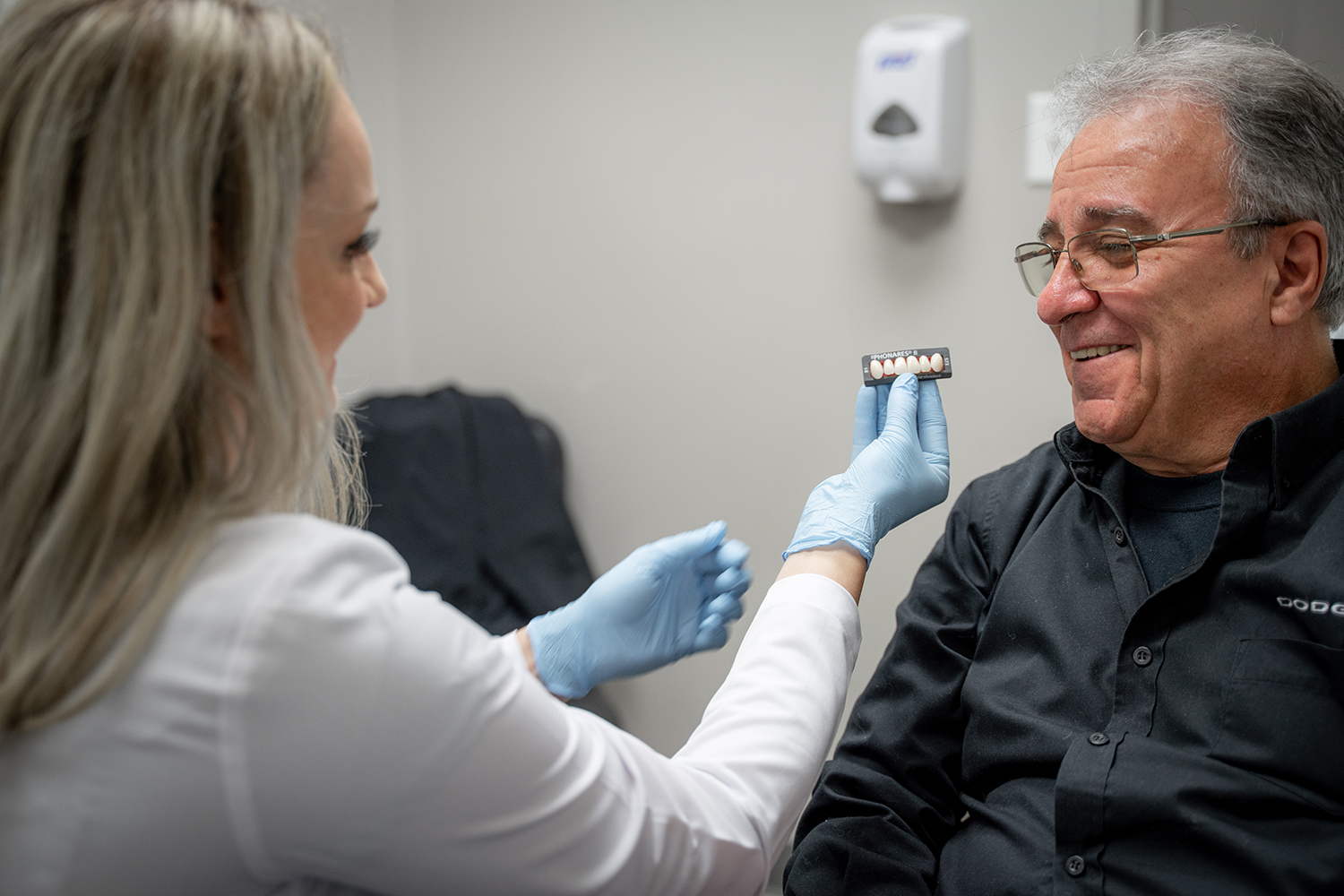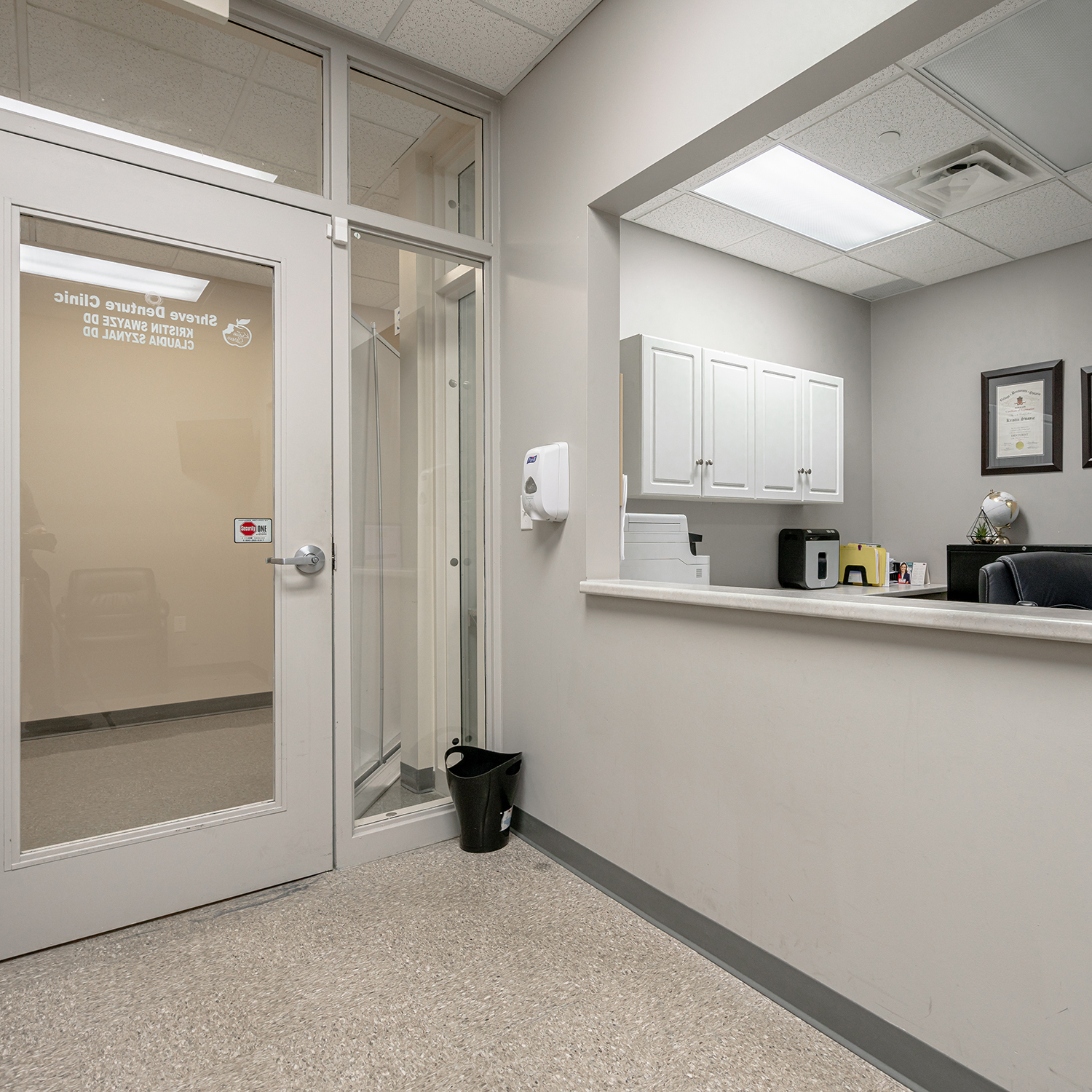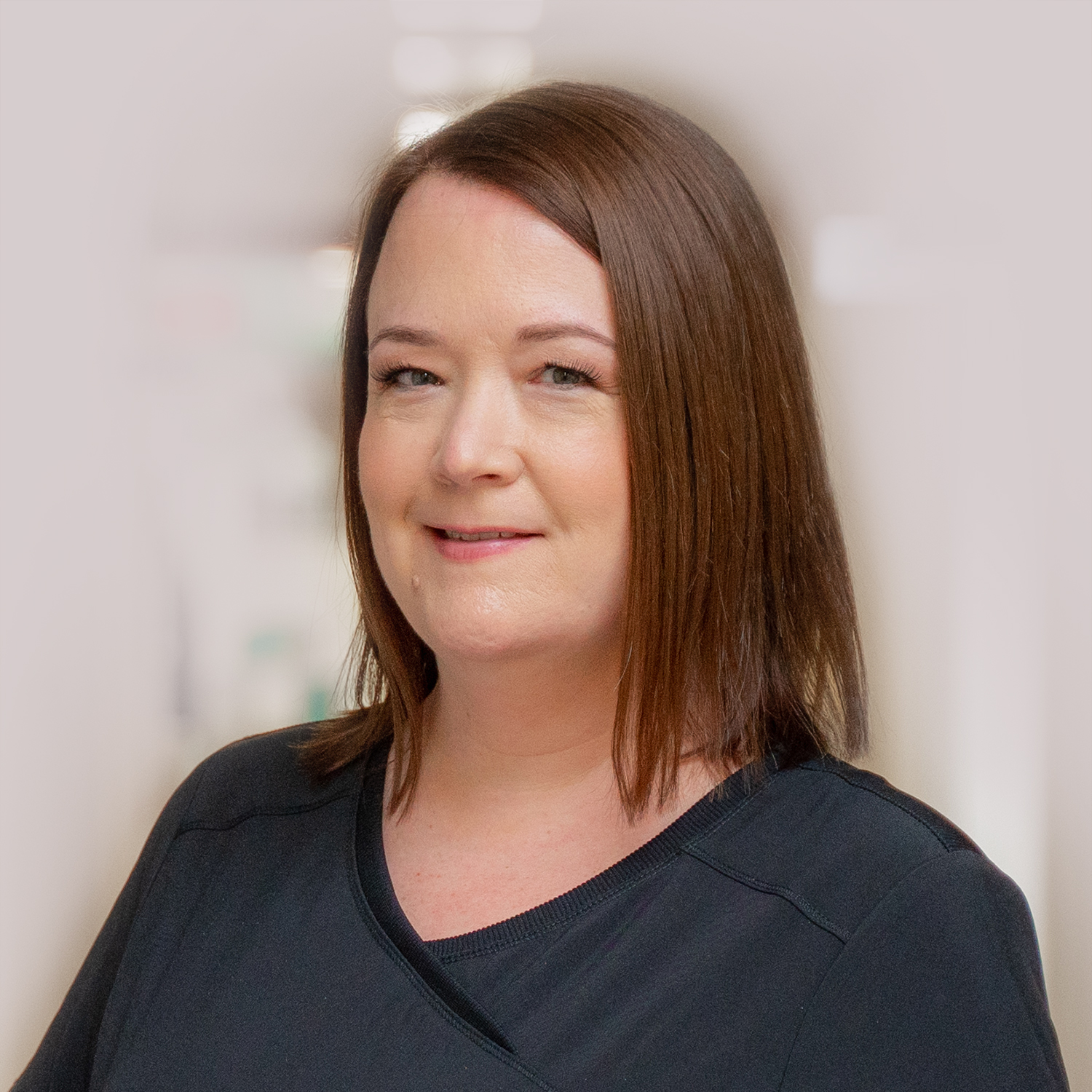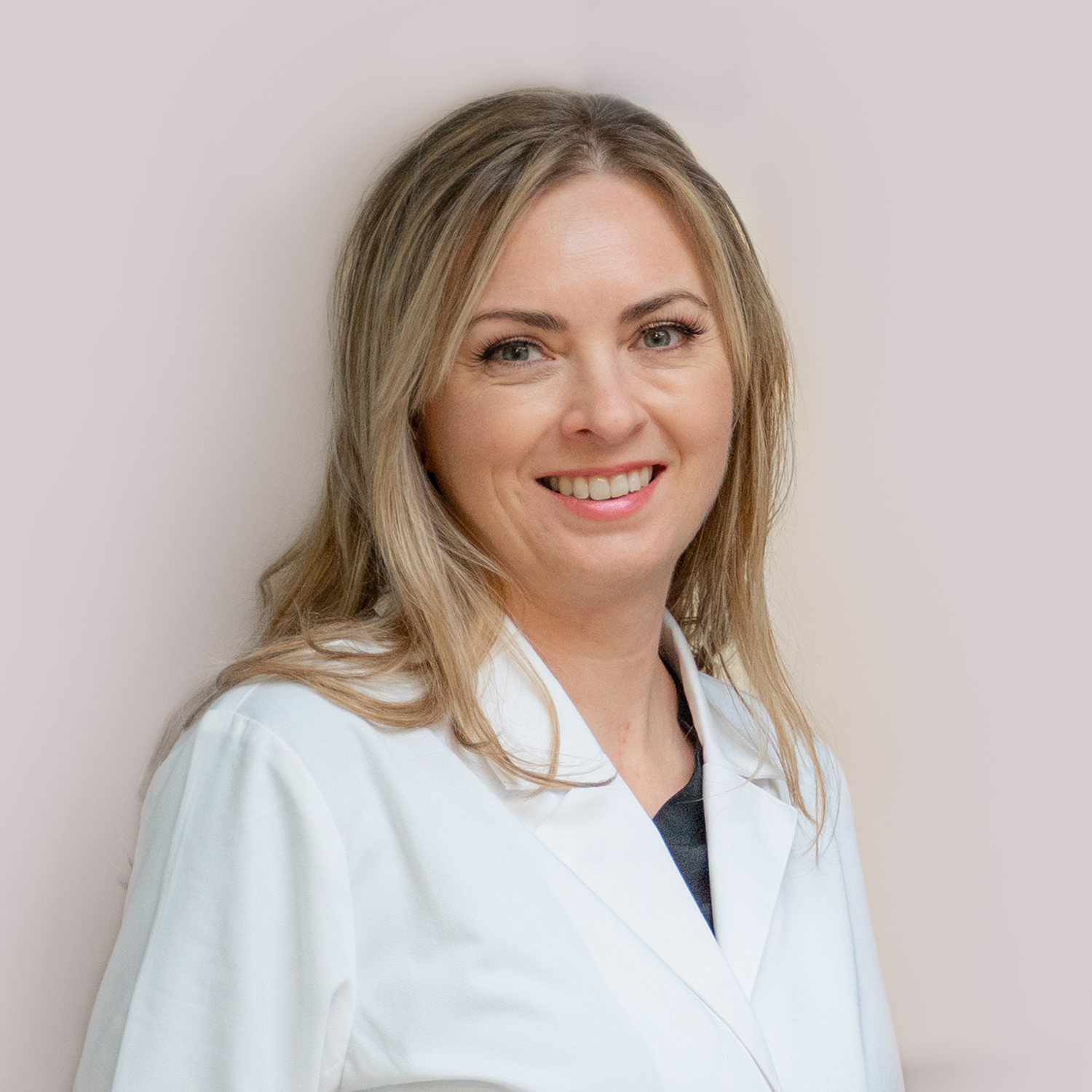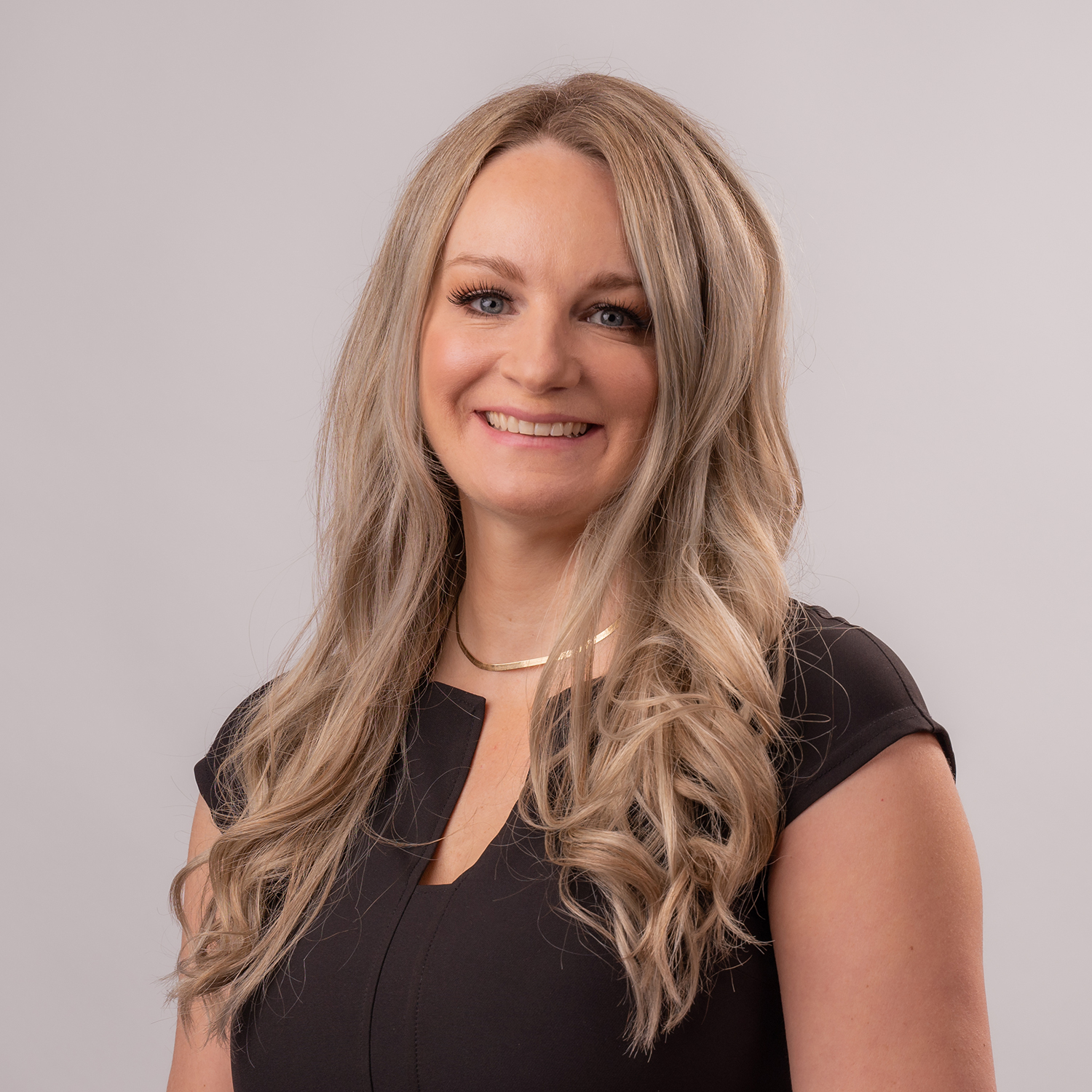Overwhelmed
by your transition to dentures?
See Shreve Denture Clinic’s FAQs
Because we understand that getting fitted for dentures for the first time can be an overwhelming transition, Shreve Denture Clinic believes in the importance of educating our patients. That is why we’ve assembled a list of our frequently asked questions and answers for you to browse. Should you not find the answer to your specific question listed on this page, feel free to contact our office today via phone or email. A member of our staff would be more than happy to assist you!
General Questions
No, you do not need a referral to come and see us at Shreve Denture Clinic! Many of our referrals come from past and present patients. We always welcome new patients at our Leamington office, and our consultations are free.
Dentures can help you look your best. They will support your facial tissues, reduce fine lines, and fill empty spaces left by missing teeth, giving you a more youthful appearance. At Shreve Denture Clinic we work with you to select the shape and colour of your teeth, which you then will be able to see and approve before the dentures are fabricated. When being fitted for dentures, it is important to look in the mirror and ensure you like the way your new dentures will make you look and feel before they are finished.
You may find that you will have to practice pronouncing certain words while you are speaking with new dentures. It is also not uncommon for your dentures to move slightly when you laugh, cough, or smile. We recommend learning to speak slower and practice repositioning your dentures by gently biting down and swallowing.
Eating is also going to require some patience. You will need to start with softer foods cut into smaller pieces at first. You will probably have to learn to chew slowly using both sides of your mouth at the same time. Once you’ve become more accustomed to eating with your dentures, you can resume your normal diet.
Full (or complete) dentures replace all of your natural teeth. While partial dentures help bridge gaps between missing teeth, you can replace multiple teeth or even just one tooth with a partial denture.
Immediate dentures are inserted into your mouth immediately after your natural teeth have been removed, which allows you to never have to be without your teeth. They are usually made in the likeness of your natural teeth. However, if you are unhappy with your smile, we can customize one that is perfect just for you.
A dental implant is a replacement tooth root made of a small titanium post that is surgically placed into the jaw. It is used to replace missing roots and support or retain artificial replacement teeth and dentures. Once implants are placed dentures can be attached onto the implants which then secures the denture into place. This helps stop the movement of your dentures, reduces sore spots in the mouth, and helps slow bone degeneration. It is the closest replacement for your natural teeth.
Thanks to modern advancements in dentistry, the pain associated with a dental implant surgery is usually minor. In many cases, it is far less intense than a tooth extraction.
General Questions
No, you do not need a referral to come and see us at Shreve Denture Clinic! Many of our referrals come from past and present patients. We always welcome new patients at our Leamington office, and our consultations are free.
Dentures can help you look your best. They will support your facial tissues, reduce fine lines, and fill empty spaces left by missing teeth, giving you a more youthful appearance. At Shreve Denture Clinic we work with you to select the shape and colour of your teeth, which you then will be able to see and approve before the dentures are fabricated. When being fitted for dentures, it is important to look in the mirror and ensure you like the way your new dentures will make you look and feel before they are finished.
You may find that you will have to practice pronouncing certain words while you are speaking with new dentures. It is also not uncommon for your dentures to move slightly when you laugh, cough, or smile. We recommend learning to speak slower and practice repositioning your dentures by gently biting down and swallowing.
Eating is also going to require some patience. You will need to start with softer foods cut into smaller pieces at first. You will probably have to learn to chew slowly using both sides of your mouth at the same time. Once you’ve become more accustomed to eating with your dentures, you can resume your normal diet.
Full (or complete) dentures replace all of your natural teeth. While partial dentures help bridge gaps between missing teeth, you can replace multiple teeth or even just one tooth with a partial denture.
Immediate dentures are inserted into your mouth immediately after your natural teeth have been removed, which allows you to never have to be without your teeth. They are usually made in the likeness of your natural teeth. However, if you are unhappy with your smile, we can customize one that is perfect just for you.
A dental implant is a replacement tooth root made of a small titanium post that is surgically placed into the jaw. It is used to replace missing roots and support or retain artificial replacement teeth and dentures. Once implants are placed dentures can be attached onto the implants which then secures the denture into place. This helps stop the movement of your dentures, reduces sore spots in the mouth, and helps slow bone degeneration. It is the closest replacement for your natural teeth.
Thanks to modern advancements in dentistry, the pain associated with a dental implant surgery is usually minor. In many cases, it is far less intense than a tooth extraction.
Appointment Questions
Appointment #1 - Preliminary Impressions
Moulds are taken of your mouth. The moulds allow Shreve Denture Clinic to analyze and assess the anatomy of your mouth to create your custom solution.
Appointment #2 - Bite Registration
Your bite registration will be taken to determine how your upper and lower jaws relate to one another. This “bite” will help define the parameters for where your denture teeth will be placed. Tooth shade and shape are also decided with you and your denturist at this appointment. We will discuss what you want to change and how you want to improve your smile to achieve your desired appearance.
Appointment #3 - Try-in/Preview
Your denture teeth will be ‘previewed’. You will try-in your new teeth while they are still in wax. The try-in approximates how your new dentures will appear and fit when they are completed. At this point, if modifications are required, they can be completed prior to the transformation of your dentures into their finished form. If any changes are required, an additional ‘retry’ appointment will be arranged.
Appointment #4 - Finish/Denture Insert
Your dentures will be placed in your mouth and instructions will be provided on how to care for your new dentures and your mouth.
Follow-up Appointments
As your new dentures settle in, sore spots and tenderness may develop. We typically book a one-week follow-up appointment to assess how you are adjusting to your new dentures. Additional adjustment appointments can be arranged to alleviate any issues that may arise.
Maintenance Questions
The lower denture is typically more challenging to adapt to and is rarely as well fitting as the upper denture. An upper denture, in most cases, gets suction in your mouth due to the surface area of the palate, saliva, and denture extensions. A lower denture is a much smaller surface area and must contend with an interfering tongue, muscle attachments, and the floor of the mouth that lifts the denture, resulting in an inadequate seal. A lower denture stays in place with the aid of facial muscles, lips, and tongue, but it takes time for these muscles to adapt with dentures in the mouth. Implants are the best solution for stabilizing a lower denture.
It is normal for your tissue and bones to shrink a little bit over time, especially as you gain and lose weight. This may cause your dentures to loosen. If you find that your dentures are loose, they can be relined to make them fit comfortably again. Most insurance companies will cover relines every two years. As a general rule, if your dentures are more than a year or two old and you use denture adhesive but they’re still loose, it’s probably best to come in for a reline. We provide same-day relines in most cases at Shreve Denture Clinic. However, in some cases you may need to get new dentures or implant-retained dentures may be a better option for you. Either way our Denturists can answer any questions you might have and guide you in the right direction.
Denture adhesives may be used to keep your dentures in place, but they should never be thought of as a proper substitute for long-term comfortably fitting dentures. If your dentures are worn and ill-fitting, you should consult with your denturist immediately for a reline or a replacement.
Multiple factors can contribute to the lifespan of your dentures; this can vary on how well you take care of them. What you eat and your bone structure will also be factors in determining how often you will need a replacement. Denture teeth wear with use and worn denture teeth can adversely affect the ability to chew effectively, impacting digestion. Poor digestion can result in flatulence, irritable bowels, constipation, acid reflux, and changes in diet to less nutritious softer foods. Worn dentures can also result in headaches, mouth sores, sore jaw, and altered physical appearance. Consideration for replacement dentures should be between five years and seven years.
Typically new dentures take 4 to 5 weeks to make. One appointment is usually scheduled per week, but this may be adjusted to allow patients who are looking to have their dentures quicker than within the typical 4 to 5 week period.
If possible, you should clean your dentures after every meal. We advise removing them and rinsing them. You can also brush them lightly with a special denture brush and paste to remove debris, especially if you still have some natural teeth remaining. Do not use regular toothpaste on your dentures – it is too abrasive.
Another way to care for them is to soak them at night. We import a specially developed denture soak called NovaDent and have it in stock for our patients to purchase. It is also imperative that you keep up with good oral hygiene habits and try to eat a well-balanced diet to ensure your mouth remains in good health.
We recommend seeing your denturist at least once per year for a check-up to ensure your dentures still properly fit. During your check-up, we will inspect both your oral tissues and your dentures. It may also be necessary to come in for denture repairs, relines, and adjustments from time to time. Whenever in doubt, call Shreve Denture Clinic to schedule an appointment!
Appointment Questions
Appointment #1 - Preliminary Impressions
Moulds are taken of your mouth. The moulds allow Shreve Denture Clinic to analyze and assess the anatomy of your mouth to create your custom solution.
Appointment #2 - Bite Registration
Your bite registration will be taken to determine how your upper and lower jaws relate to one another. This “bite” will help define the parameters for where your denture teeth will be placed. Tooth shade and shape are also decided with you and your denturist at this appointment. We will discuss what you want to change and how you want to improve your smile to achieve your desired appearance.
Appointment #3 - Try-in/Preview
Your denture teeth will be ‘previewed’. You will try-in your new teeth while they are still in wax. The try-in approximates how your new dentures will appear and fit when they are completed. At this point, if modifications are required, they can be completed prior to the transformation of your dentures into their finished form. If any changes are required, an additional ‘retry’ appointment will be arranged.
Appointment #4 - Finish/Denture Insert
Your dentures will be placed in your mouth and instructions will be provided on how to care for your new dentures and your mouth.
Follow-up Appointments
As your new dentures settle in, sore spots and tenderness may develop. We typically book a one-week follow-up appointment to assess how you are adjusting to your new dentures. Additional adjustment appointments can be arranged to alleviate any issues that may arise.
Maintenance Questions
The lower denture is typically more challenging to adapt to and is rarely as well fitting as the upper denture. An upper denture, in most cases, gets suction in your mouth due to the surface area of the palate, saliva, and denture extensions. A lower denture is a much smaller surface area and must contend with an interfering tongue, muscle attachments, and the floor of the mouth that lifts the denture, resulting in an inadequate seal. A lower denture stays in place with the aid of facial muscles, lips, and tongue, but it takes time for these muscles to adapt with dentures in the mouth. Implants are the best solution for stabilizing a lower denture.
It is normal for your tissue and bones to shrink a little bit over time, especially as you gain and lose weight. This may cause your dentures to loosen. If you find that your dentures are loose, they can be relined to make them fit comfortably again. Most insurance companies will cover relines every two years. As a general rule, if your dentures are more than a year or two old and you use denture adhesive but they’re still loose, it’s probably best to come in for a reline. We provide same-day relines in most cases at Shreve Denture Clinic. However, in some cases you may need to get new dentures or implant-retained dentures may be a better option for you. Either way our Denturists can answer any questions you might have and guide you in the right direction.
Denture adhesives may be used to keep your dentures in place, but they should never be thought of as a proper substitute for long-term comfortably fitting dentures. If your dentures are worn and ill-fitting, you should consult with your denturist immediately for a reline or a replacement.
Multiple factors can contribute to the lifespan of your dentures; this can vary on how well you take care of them. What you eat and your bone structure will also be factors in determining how often you will need a replacement. Denture teeth wear with use and worn denture teeth can adversely affect the ability to chew effectively, impacting digestion. Poor digestion can result in flatulence, irritable bowels, constipation, acid reflux, and changes in diet to less nutritious softer foods. Worn dentures can also result in headaches, mouth sores, sore jaw, and altered physical appearance. Consideration for replacement dentures should be between five years and seven years.
Typically new dentures take 4 to 5 weeks to make. One appointment is usually scheduled per week, but this may be adjusted to allow patients who are looking to have their dentures quicker than within the typical 4 to 5 week period.
If possible, you should clean your dentures after every meal. We advise removing them and rinsing them. You can also brush them lightly with a special denture brush and paste to remove debris, especially if you still have some natural teeth remaining. Do not use regular toothpaste on your dentures – it is too abrasive.
Another way to care for them is to soak them at night. We import a specially developed denture soak called NovaDent and have it in stock for our patients to purchase. It is also imperative that you keep up with good oral hygiene habits and try to eat a well-balanced diet to ensure your mouth remains in good health.
We recommend seeing your denturist at least once per year for a check-up to ensure your dentures still properly fit. During your check-up, we will inspect both your oral tissues and your dentures. It may also be necessary to come in for denture repairs, relines, and adjustments from time to time. Whenever in doubt, call Shreve Denture Clinic to schedule an appointment!
Payment Questions
The cost of new dentures depends on what type of dentures you need or that you may choose. Full, Partial, and Immediate dentures all have different costs. Other features you choose to have incorporated in your dentures can increase the cost (soft liners, metal strengtheners, and implant components). At Shreve Denture Clinic we offer FREE consultations to assess your needs and provide you with an accurate estimate of expected costs.
Implants and the dentures attached to implants vary in cost based on how many you need and what type of prosthetic is attached to the implants. In general implants have become more affordable and are often much less expensive than you may think. It is best to see one of our Denturists at Shreve Denture Clinic to explain all your options and determine what solution is best for you. If financially you are concerned, we now offer simple affordable financing to aid you in achieving your implant solution.
All dental insurance policies offer different coverages. To determine whether your insurance policy covers dentures, we can send a predetermination to your insurance provider.
Payment Questions
The cost of new dentures depends on what type of dentures you need or that you may choose. Full, Partial, and Immediate dentures all have different costs. Other features you choose to have incorporated in your dentures can increase the cost (soft liners, metal strengtheners, and implant components). At Shreve Denture Clinic we offer FREE consultations to assess your needs and provide you with an accurate estimate of expected costs.
Implants and the dentures attached to implants vary in cost based on how many you need and what type of prosthetic is attached to the implants. In general implants have become more affordable and are often much less expensive than you may think. It is best to see one of our Denturists at Shreve Denture Clinic to explain all your options and determine what solution is best for you. If financially you are concerned, we now offer simple affordable financing to aid you in achieving your implant solution.
All dental insurance policies offer different coverages. To determine whether your insurance policy covers dentures, we can send a predetermination to your insurance provider.
Why should a Denturist
make my dentures?
A Denturist is a denture professional dedicated to providing denture care and is specially trained in the design, construction, fitting, and adjustment of complete and partial dentures, and dentures on implants. A denturist can assess and advise a variety of features and benefits for your dentures, specific to your needs so that you will smile with confidence.
At Shreve Denture Clinic, we have an on-site lab where all the laboratory work required to fabricate your dentures is completed. This on-site work allows us to pay close attention to every detail while making and fitting your dentures and enables a more efficient process at more reasonable fees for our patients. We are also able to complete same-day repairs and relines which then allows you to not have to be without your denture for long periods of time.
Why should a Denturist
make my dentures?
A Denturist is a denture professional dedicated to providing denture care and is specially trained in the design, construction, fitting, and adjustment of complete and partial dentures, and dentures on implants. A denturist can assess and advise a variety of features and benefits for your dentures, specific to your needs so that you will smile with confidence.
At Shreve Denture Clinic, we have an on-site lab where all the laboratory work required to fabricate your dentures is completed. This on-site work allows us to pay close attention to every detail while making and fitting your dentures and enables a more efficient process at more reasonable fees for our patients. We are also able to complete same-day repairs and relines which then allows you to not have to be without your denture for long periods of time.
